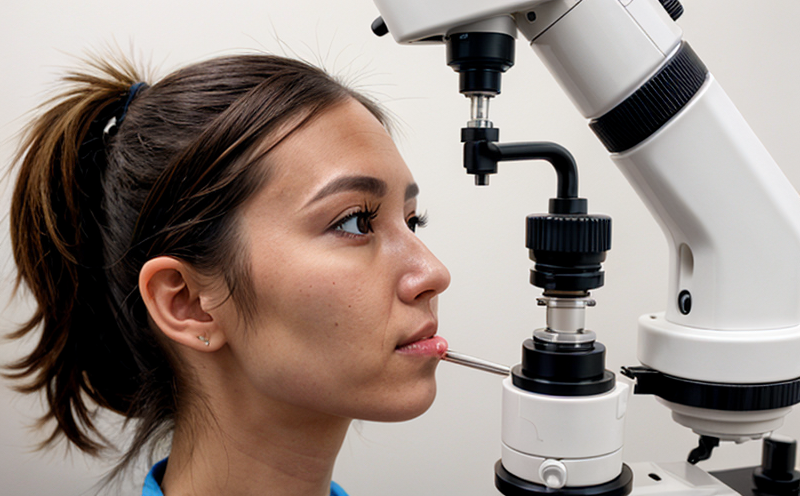ISO 11979-7 Intraocular Lens Clinical Investigation Compliance Testing
The ISO 11979 series of standards provides a comprehensive framework for the development, testing, and clinical investigation of intraocular lenses (IOLs), which are critical components in ophthalmic surgery. Specifically, ISO 11979-7:2018 focuses on the assessment of IOLs during their clinical trial phase to ensure they meet stringent regulatory requirements for safety and efficacy.
This service ensures that your intraocular lenses comply with ISO standards by conducting rigorous testing that includes biomechanical evaluation, optical performance analysis, and biocompatibility assessments. Our team of experts utilizes state-of-the-art equipment and follows internationally recognized protocols to provide you with accurate data required for clinical trials and regulatory submissions.
The process begins with thorough specimen preparation which involves sterilization methods suitable for the type of lens being tested. Biomechanical testing assesses how well the IOLs can withstand mechanical stresses without compromising their structural integrity or optical properties under simulated intraocular conditions.
Optical performance tests measure various parameters such as light transmission, chromatic aberration, and astigmatic effect to ensure that these lenses meet visual acuity standards. Additionally, biocompatibility evaluations examine how the IOLs interact with human tissues over extended periods following implantation surgery.
The results from these tests are meticulously documented using detailed reports tailored specifically for clinical trial documentation purposes. These documents serve as crucial evidence during regulatory reviews and approvals processes.
Our dedicated laboratory adheres strictly to ISO 11979-7 guidelines throughout the entire testing cycle, ensuring accurate measurements and reliable outcomes that contribute positively towards successful product launches in both domestic and international markets.
Why It Matters
The importance of meeting stringent ISO standards like ISO 11979-7 cannot be overstated when it comes to developing safe and effective intraocular lenses. Compliance with these guidelines helps manufacturers demonstrate their products' reliability and quality, thereby building trust among healthcare providers and patients alike.
- Enhances Patient Safety: By rigorously testing IOLs according to ISO 11979-7, we ensure that only safe devices reach the market. This reduces risks associated with potential failures or adverse reactions post-surgery.
- Fosters Regulatory Approval: Meeting these standards increases the likelihood of favorable outcomes during regulatory reviews and approvals processes, streamlining product launch timelines.
- Sustains Competitive Advantage: Consistent adherence to global best practices positions your company favorably against competitors who may not invest in comparable testing protocols.
In summary, compliance with ISO 11979-7 is essential for maintaining high standards of product quality and ensuring that your intraocular lenses are safe, effective, and suitable for clinical use.
Quality and Reliability Assurance
At our laboratory, we take pride in offering comprehensive quality assurance services designed to meet the highest levels of reliability expected within the medical device industry. Our ISO 11979-7 Intraocular Lens Clinical Investigation Compliance Testing service is no exception.
| Testing Parameter | Description |
|---|---|
| Biomechanical Evaluation | This involves assessing the mechanical stability and durability of IOLs under various stress conditions to ensure they perform consistently post-surgery. |
| Optical Performance Analysis | Involves measuring light transmission, chromatic aberration, astigmatic effect, etc., ensuring optimal visual outcomes for patients. |
| Biocompatibility Assessments | Evaluates interactions between IOLs and human tissues over extended periods to determine biocompatibility. |
Our team employs advanced instrumentation calibrated according to ISO specifications, ensuring precise measurements and repeatable results. Furthermore, we maintain strict quality control measures at every stage of the testing process to guarantee reliability.
The comprehensive nature of our services allows us to provide robust documentation necessary for successful clinical trials and regulatory submissions. This not only enhances your product's credibility but also expedites its path towards market approval.
Use Cases and Application Examples
- Premature Lens Implantation: Testing IOLs intended for premature lens implantation surgeries to ensure they can withstand the unique biomechanical demands of younger patients' eyes.
- Refractive Surgery Lens Development: Evaluating new designs or materials used in creating lenses specifically aimed at correcting refractive errors like myopia, hypermetropia, and astigmatism.
- Bifocal and Multifocal Lenses: Assessing the performance of multifunctional IOLs that offer simultaneous correction for multiple visual impairments post-surgery.
- Cataract Surgery Lens Improvement: Enhancing existing cataract surgery lenses by incorporating advanced materials or design modifications to improve outcomes.
- New Material Testing: Investigating the suitability of novel biomaterials for use in IOL construction based on their biocompatibility, durability, and optical properties.
In each case, our testing adheres strictly to ISO 11979-7 guidelines ensuring that all devices meet rigorous safety and efficacy criteria before being introduced into clinical practice.





